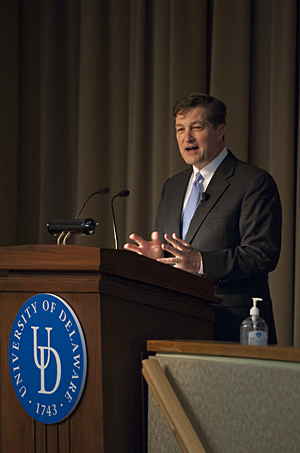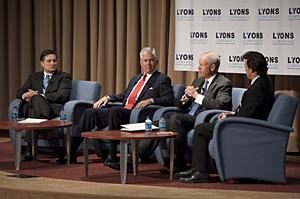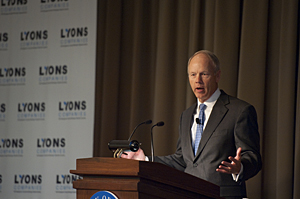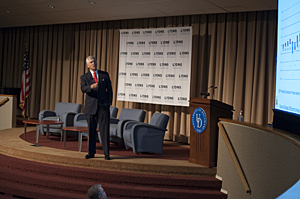

ADVERTISEMENT
- Rozovsky wins prestigious NSF Early Career Award
- UD students meet alumni, experience 'closing bell' at NYSE
- Newark Police seek assistance in identifying suspects in robbery
- Rivlin says bipartisan budget action, stronger budget rules key to reversing debt
- Stink bugs shouldn't pose problem until late summer
- Gao to honor Placido Domingo in Washington performance
- Adopt-A-Highway project keeps Lewes road clean
- WVUD's Radiothon fundraiser runs April 1-10
- W.D. Snodgrass Symposium to honor Pulitzer winner
- New guide helps cancer patients manage symptoms
- UD in the News, March 25, 2011
- For the Record, March 25, 2011
- Public opinion expert discusses world views of U.S. in Global Agenda series
- Congressional delegation, dean laud Center for Community Research and Service program
- Center for Political Communication sets symposium on politics, entertainment
- Students work to raise funds, awareness of domestic violence
- Equestrian team wins regional championship in Western riding
- Markell, Harker stress importance of agriculture to Delaware's economy
- Carol A. Ammon MBA Case Competition winners announced
- Prof presents blood-clotting studies at Gordon Research Conference
- Sexual Assault Awareness Month events, programs announced
- Stay connected with Sea Grant, CEOE e-newsletter
- A message to UD regarding the tragedy in Japan
- More News >>
- March 31-May 14: REP stages Neil Simon's 'The Good Doctor'
- April 2: Newark plans annual 'wine and dine'
- April 5: Expert perspective on U.S. health care
- April 5: Comedian Ace Guillen to visit Scrounge
- April 6, May 4: School of Nursing sponsors research lecture series
- April 6-May 4: Confucius Institute presents Chinese Film Series on Wednesdays
- April 6: IPCC's Pachauri to discuss sustainable development in DENIN Dialogue Series
- April 7: 'WVUDstock' radiothon concert announced
- April 8: English Language Institute presents 'Arts in Translation'
- April 9: Green and Healthy Living Expo planned at The Bob
- April 9: Center for Political Communication to host Onion editor
- April 10: Alumni Easter Egg-stravaganza planned
- April 11: CDS session to focus on visual assistive technologies
- April 12: T.J. Stiles to speak at UDLA annual dinner
- April 15, 16: Annual UD push lawnmower tune-up scheduled
- April 15, 16: Master Players series presents iMusic 4, China Magpie
- April 15, 16: Delaware Symphony, UD chorus to perform Mahler work
- April 18: Former NFL Coach Bill Cowher featured in UD Speaks
- April 21-24: Sesame Street Live brings Elmo and friends to The Bob
- April 30: Save the date for Ag Day 2011 at UD
- April 30: Symposium to consider 'Frontiers at the Chemistry-Biology Interface'
- April 30-May 1: Relay for Life set at Delaware Field House
- May 4: Delaware Membrane Protein Symposium announced
- May 5: Northwestern University's Leon Keer to deliver Kerr lecture
- May 7: Women's volleyball team to host second annual Spring Fling
- Through May 3: SPPA announces speakers for 10th annual lecture series
- Through May 4: Global Agenda sees U.S. through others' eyes; World Bank president to speak
- Through May 4: 'Research on Race, Ethnicity, Culture' topic of series
- Through May 9: Black American Studies announces lecture series
- Through May 11: 'Challenges in Jewish Culture' lecture series announced
- Through May 11: Area Studies research featured in speaker series
- Through June 5: 'Andy Warhol: Behind the Camera' on view in Old College Gallery
- Through July 15: 'Bodyscapes' on view at Mechanical Hall Gallery
- More What's Happening >>
- UD calendar >>
- Middle States evaluation team on campus April 5
- Phipps named HR Liaison of the Quarter
- Senior wins iPad for participating in assessment study
- April 19: Procurement Services schedules information sessions
- UD Bookstore announces spring break hours
- HealthyU Wellness Program encourages employees to 'Step into Spring'
- April 8-29: Faculty roundtable series considers student engagement
- GRE is changing; learn more at April 15 info session
- April 30: UD Evening with Blue Rocks set for employees
- Morris Library to be open 24/7 during final exams
- More Campus FYI >>
12:26 p.m., Feb. 11, 2011----The 2011 Economic Forecast conference brought together almost 250 Delaware business owners, educators and economic enthusiasts to Clayton Hall on the University of Delaware's Laird Campus in Newark Tuesday morning.
The annual event, sponsored by Lyons Companies, the University of Delaware Center for Economic Education and Entrepreneurship and Chubb Group of Insurance Companies, featured presentations and a panel discussion by a distinguished group of financial analysts including former U.S. Sen. Don Nickles, president of the Federal Reserve Bank of Richmond Jeffrey Lacker and CNBC contributor and financial consultant Michael Farr.
David Lyons of the Lyons Companies, Gov. Jack Markell and UD President Patrick Harker greeted attendees.
“There's a big picture forming around innovation and entrepreneurship, and the role of universities in supporting and rewarding risk-taking and risk-takers,” said Harker. “I consider this our mission: to actively build our creative capital, to gather together our intellectual assets and deploy them to build a vibrant, sustainable economy fueled by discovery, invention and innovation.”
As part of this mission, Harker spoke about a number of regional partnerships that are expanding the University's reach and economic-development potential, including those with the U.S. Army at Aberdeen Proving Ground, the Gamesa Corporation and the Delaware Health Sciences Alliance with Thomas Jefferson University, Christiana Care and Nemours.
Following Harker, each speaker shared his outlook on the economy.
Lacker began, predicting growth in the U.S. economy of about 4 percent this year and suggesting hiring would gain momentum that would in turn allow consumers to increase spending. He also called for re-evaluation of the federal monetary stimulus program.
“As the economy shows signs of improvement, we need to withdraw stimulus funding,” said Lacker.
Nickles followed, calling the present tax code “suffocating.”
“It puts us at a disadvantage,” he said. “We need to be competitive internationally, and an obsolete tax code can suffocate initiative, entrepreneurial spirit and the opportunity to expand. We need to make changes in order to move forward.”
Farr questioned the sustainability of the recovery, noting that the easy part is over. Instead, he focused on the growing wealth gap and depressed housing market.
“Large concentrations of wealth do not appear healthy for the economy,” Farr suggested. “The richest Americans continue to gain wealth while the poor do not, and this could have long-term negative consequences for the U.S. economy.”
Farr also noted that improving the housing market is key to sustainable economic improvement.
“Almost 11 percent of properties are vacant and 23 percent of mortgages outstanding are underwater,” said Farr. “This weakened housing market can negatively impact consumer spending. The federal government stimulus has been broad-based and there certainly have been some positive effects, but the question is, will it take hold and become self-sustaining?”
William Latham of UD's Alfred Lerner College of Business and Economics and the Center for Applied Business and Economic Research ended the round of presentations, talking briefly on Delaware's economy.
The event concluded with a panel discussion moderated by Jon Hilsenrath, chief economic correspondent with the Wall Street Journal.
At that time, the speakers shared their views in more depth on the bond purchase program, other stimulus funding and the need to re-evaluate the program as the economy improves. They also touched on entitlements and defined benefit and contribution plans.
Hilsenrath, in keeping the panel on its toes, also persuaded Farr to share advice on some potential stock investment choices (multinational stocks, not bonds, said Farr) and Nickles to share his thoughts on future presidential hopefuls.
Article by Kathryn A. Marrone
Photo by Kathy F. Atkinson




